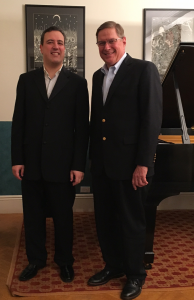I first saw Michael Bulychev-Okser while I was meeting other guests in the foyer of Mr. Shoemaker’s home at Central Park West. While many pianists seclude themselves backstage prior to performing, our pianist for this December evening stood nearby, friendly and engaged.
This was a good sign. At Mr. Shoemaker’s salon concerts there is no stage to elevate the pianist, and no stage lighting to isolate the performer. The pianist and the audience inhabit the same space, and Bulychev-Okser appeared ready to make the most of this.
Michael Bulychev-Okser
Bulychev-Okser is an enterprising and accomplished pianist and composer who began his studies in Russia and now lives in the United States. You can find his extensive bio on the web site of the Gershwin International Music Competition, which he founded and directs. He also founded the Alion Baltic International Music Festival.
Low-key Style
Mr. Bulychev-Okser’s low-key style made it easy for him to connect with his audience, despite his imposing résumé. He introduced each work to us, sometimes with humorous anecdotes, before playing it. At the keyboard, he did not indulge in theatrical gestures or other artifice to tell his audience how to feel: he just played his heart out for us.
The Program
The program was heavily weighted toward piano arrangements. Here is the detail, with links to representative YouTube videos.
- Von Bulow, arr. Liszt – Dante “Tanto gentile e tanto onesta” S. 479
- Glinka, arr. Balakirev – The Lark (Olga Scheps)
- Brahms, arr. Schutt- Lullaby (Bulychev-Okser)
- Arensky, arr. Siloti – By the Fountain (Zeynelova)
- Alabyev, arr. Liszt – The Nightingale (Bulychev-Okser)
- Kreisler, Arr. Rachmaninov – Liebeslied (Rachmaninov!)
- Rachmaninov – Etudes-Tableaux, Op. 33, No. 2 in C Major, No. 5 in D Minor
- Bulychev-Okser – Hermes and Satire – Jazz Fantasy
- Gershwin, arr. Wilde – The Man I love & Somebody Loves Me
- Gershwin – Rhapsody in Blue Potpourri
Russian
The repertoire was substantially Russian, from Balakirev/Glinka thru Arensky, Alabyev and Rachmaninov. And Bulychev-Okser himself came across as a seriously Russian pianist. No surprise there, given his Moscow Conservatory roots.
But if Bulychev-Oksner had not spoken to us in his melodic Russian accent, would his performance have felt so Russian? Was I deluding myself into perceiving the authenticity of Glinka/Balakirev’s plaintive Lark, Rachmaninov’s soulfulness, or the balalaika-like dance that breaks out around 2 minutes into The Nightingale? I don’t think so!
I’m used to softer versions of The Nightingale, but I loved how Bulychev-Okser threw himself into this piece. He made the floor shake and our ears ring. You don’t often see a world-class pianist stomping the sustain pedal as if he were wearing Cossack boots. In a less intimate performance space, everyone would have cheered.
American
It was harder for me to relate to the concluding elements of the program, including Bulychev-Okser’s own composition, because I don’t understand jazz. However I enjoy Gershwin, and looked forward to the Rhapsody in Blue Potpourri. Unfortunately the original work (here) outshines any substitute. So I was a little underwhelmed, through no fault of the pianist.
An Evening of Contrasts
The piano sang when Bulychev-Okser played Russian repertoire. When his program shifted from Russian to American it was more in keeping with his adopted country’s culture, but less compelling. While America is also my adopted country, I personally preferred Bulychev-Okser’s Russian material. Finally, I don’t think that anyone who attended will forget his floor-shaking Nightingale.

You must be logged in to post a comment.